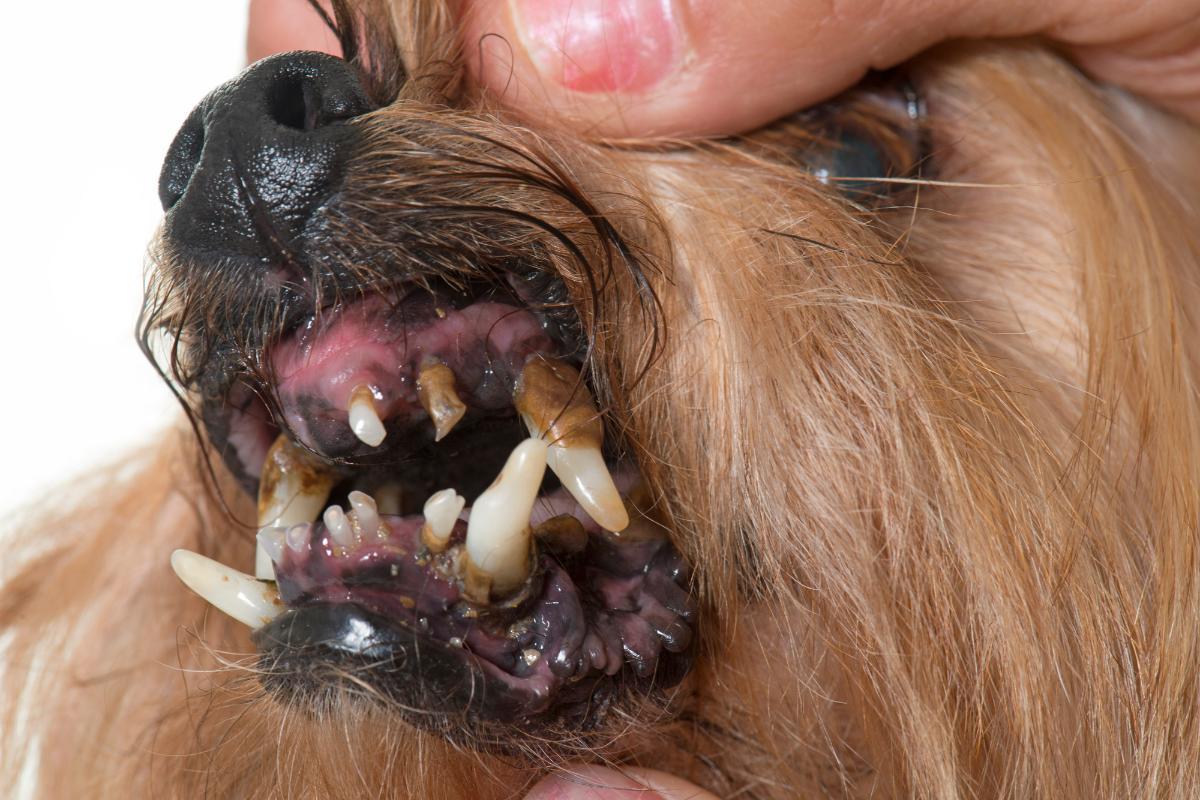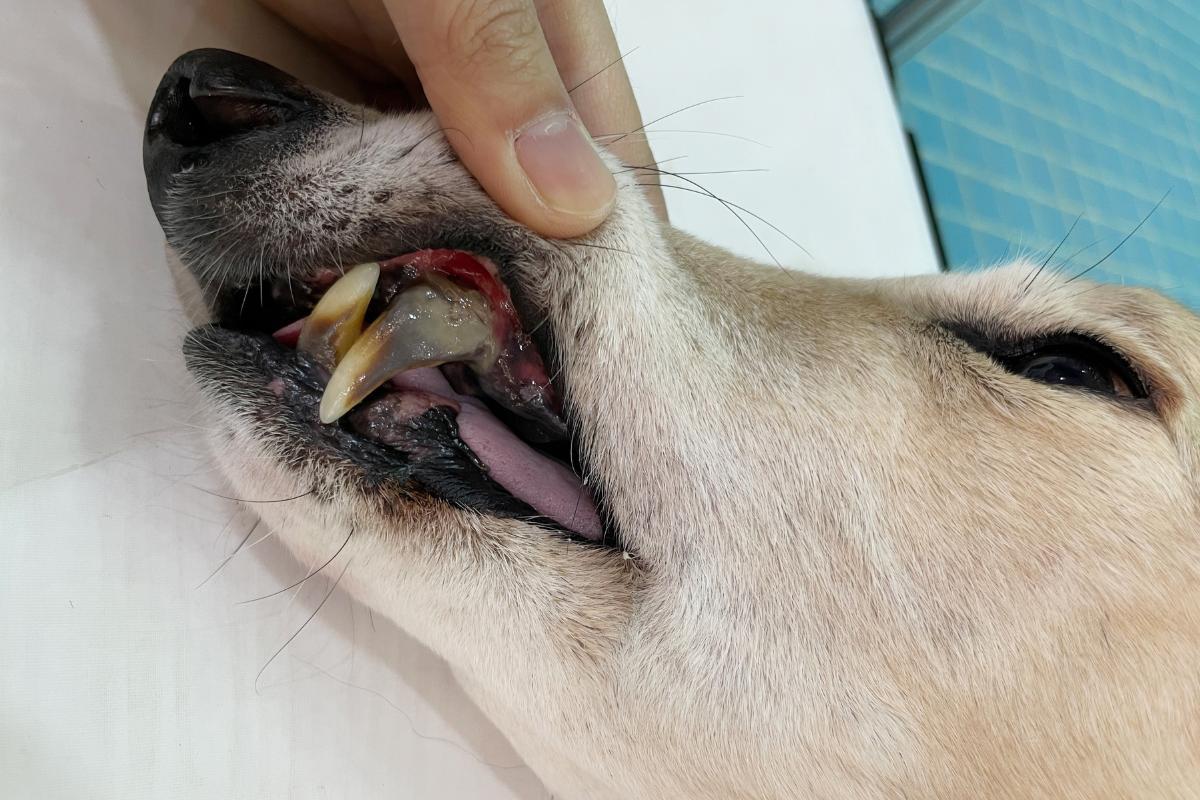Sore Mouth in Dogs - Causes and Treatment



See files for Dogs
It might take a while for us to notice a sore mouth in our dog. Generally speaking, dogs are good at hiding their pain. The cause of their sore mouth may have originated a long time before we observe any symptoms. If we see the dog pawing their face or refusing to eat due to the discomfort present in their mouth, we might suspect there is a problem. Looking into the dog's mouth, we might see more evident symptoms it is sore such as inflammation of the gums, bleeding or even ulcerations. This pain is often a result of a bacterial infection, whether a primary infection of the mouth or a secondary infection as a result of poor oral health.
At AnimalWised, we discover the causes and treatment of a sore mouth in dogs. We find out what leads to mouth problems in dogs, as well as how to best prevent them developing in the future.
Sore mouth in dogs causes
Oral health problems will often lead to soreness in the dog's mouth. The oral tissues of dogs are very sensitive and damage can occur more easily than in some other parts. They also use their mouth for various activities which can result in traumatic damage, such as chewing on hard objects.
Dogs use their mouth to interact with their environment, resulting in exposure to various pathogens. A strong immune system can protect against these pathogens, but they are still susceptible to infection. For example, a dog may consume the feces of another dog and the bacteria present infects a cut in their mouth. If the dog's immune system is weakened, there may be a proliferation of otherwise normal bacteria which can lead to infection.
Tooth decay and other dental problems are a common reason a dog's mouth is sore. These problems are often related to poor dental hygiene, something many guardians neglect in their dogs.
With these factors in mind, we look at the causes of a sore mouth in dogs:
- Caries: also known as cavities, caries are the result of tooth decay. Acids in the mouth are synthesized by bacterial plaque on the teeth, causing damage to tooth enamel. Calcium salts are degraded and the teeth develop holes which can go down as far as the pulp. This can lead to abscesses which can be very painful for the animal.
- Tartar: also known as dental calculus, it consists of the calcification or hardening of the bacterial plaque. This is a result of the deposit of minerals from saliva, such as potassium, calcium or phosphorus salts. Sometimes, this tartar can occur on the edges of the gums, causing inflammation. This gum inflammation is known as gingivitis in dogs.
- Periodontal disease: when the tartar buildup progresses to a sufficient state, it can result in something known as periodontitis or periodontal disease. This disease consists of the advancement of bacterial damage, causing inflammation of the gums. Once it reaches the periodontium (tissues that support the teeth), they can cause the teeth to move, break, fall out or even reabsorb. This can lead to infections which result in inflammation and subsequent abscesses. This creates a risk of blood poisoning.
- Trauma: physical trauma to a dog's mouth can occur for many reasons. It could be the result of a fall, traffic collision, fight or even something as seemingly innocuous as catching a frisbee. Especially if their mouth is already weakened by another problem, even mild trauma can result in pain. The presence of foreign bodies such as broken plant matter can result in trauma.
- Stomatitis: stomatitis in dogs is the inflammation of the oral mucosa which can be caused by poor dental health, congenital diseases, foreign bodies or even systemic disease, among others. This can cause the dog's entire mouth to be sore if it spreads throughout.
- Oral tumors: whether benign or malignant, tumors in the mouth can result in pain and soreness. These are serious problems which can metastasize and result in the dog's death, but even benign tumors can cause discomfort.
- Other diseases: there are certain diseases which might not cause direct oral damage, but can cause the dog's mouth to be sore as a secondary effect. For example, if a dog has an autoimmune disease, their weakened immune system can lead to increased likelihood of oral infections. Other health issues such as nutritional deficiencies, diabetes, allergies or genetic conditions can influence poor oral health.
There are other factors which can influence a sore mouth in dogs. These include side effects from certain drugs, with the use of corticosteroids in dogs being particularly linked to oral health issues. Another issue is the emergence of teeth underneath the dog's existing dental formula. While relatively rare, it can be very painful for the dog. Learn more with our article explaining double canine teeth in dogs.
Symptoms of a sore mouth in dogs
As you can see from the above causes of a sore mouth in dogs, the origins of the pain and discomfort are varied. Soreness is itself a symptom, but we need to look at related physical and behavioral symptoms which would indicate the dog is having problems. The following symptoms may indicate the dog has a sore mouth:
- Loss of appetite or refusal to eat food
- Mouth or gum bleeding
- Pawing at the mouth
- Loose teeth
- Yellowish teeth
- Sensitivity to touch
- Inflammation
- Phlegmon (acute inflammation of soft tissues)
- Fever
- Chewing only on one side of the mouth
- Halitosis (bad breath)
- Nasal or ocular discharge
- Red gums
- Hypersalivation
As we have stated above, dogs are prone to hiding their discomfort due to a relatively high pain tolerance. However, once the problem progresses, this will be impossible to hide. For this reason, it is very important which check our dog's mouth regularly for any signs of an oral health problem. If we do see worrying symptoms, we need to take them to a veterinarian for diagnosis.

Sore mouth in dogs diagnosis
Since there are multiple possible causes of a sore mouth in the dog, it is vital that we take the dog to a veterinarian for diagnosis. It is not sufficient to simply improve the dog's oral hygiene. The underlying problem needs to be addressed, otherwise the problem can worsen. For example, if poor oral hygiene has resulted in a tooth abscess, simple brushing of the dog's teeth with not solve the problem.
Once you make an appointment with the veterinarian, they will be able to assess the dog. This will involve a physical examination of the mouth for any sores, wounds, tumors or other symptoms which can lead to a diagnosis. They may also need to carry out other complimentary tests such as a dental x-ray or blood tests. The latter is important if they need to determine the bacterial cause or even if there is cancer present.
Your dog may need assessment by a veterinarian specialized in canine dentistry. If this is the case, the vet will make a referral. They can then perform more specific tests or use their specialized training to carry out an effective diagnosis.
Sore mouth in dogs treatment
The treatment of a dog's sore mouth will depend on the cause. If it is a dental issue, the dog may need treatment by a veterinarian specialized in canine dentistry. This could involve the following treatments:
- Thorough cleaning of the mouth: this is usually necessary to remove tartar attached to the teeth and gums.
- Antibiotic: if there is an abscess present or other signs of infection, it may be necessary to use antibiotics to kill the bacterial infection.
- Analgesics: if the dog's mouth is sufficiently sore, pain relievers may be used to mitigate the pain they experience. The use of anti-inflammatories is common since it can help them to reduce inflammation.
- Extraction: some teeth may be affected to the point their damage can no longer be reversed. In these cases, extraction may be necessary to ensure the overall health of the dog.
In other cases, the cause of the sore mouth in the dog might require more specific treatment. For example, oral cancer in dogs may require surgery, chemotherapy and/or radiotherapy, among other supportive treatments. In cases where other diseases are causing secondary oral problems, their treatment will need to be addressed. In the case of autoimmune diseases, medical treatment may be used to support their immune system.

How to prevent a sore mouth in dogs
Since poor oral hygiene is a contributing factor to a dog having a sore mouth, it is important we maintain it in the animal. To do this we need to consider the following:
- Brushing teeth: brush the dog's teeth regularly. While some veterinarians suggest daily brushing to be ideal biweekly brushing is the minimal amount we should carry out for the dog.
- Diet: dogs do not need to have sugar in their diet and carbohydrates in general should be limited. We need to be careful with the type of food we give the dog. For example, older dogs may have weaker teeth and giving them food that is too tough can cause tooth damage.
- Avoid hard objects: do not throw hard objects for the dog to catch or allow them to chew on anything inappropriate. This can lead to dental fractures which cause the dog to have a sore mouth.
- Regularly checkups: not only will we need to check our dog's mouth regularly, but we need to take the dog for regular veterinary checkups during which their oral health can be established. Veterinarians may see symptoms which we cannot perceive.
Prompt veterinary treatment is an important factor. Without it, serious repercussions can affect the dog's health and well-being. In serious cases, the result can be fatal.
Learn more about dental health in dogs with our article explaining why my dog has rotten teeth.
This article is purely informative. AnimalWised does not have the authority to prescribe any veterinary treatment or create a diagnosis. We invite you to take your pet to the veterinarian if they are suffering from any condition or pain.
If you want to read similar articles to Sore Mouth in Dogs - Causes and Treatment, we recommend you visit our Infectious diseases category.






